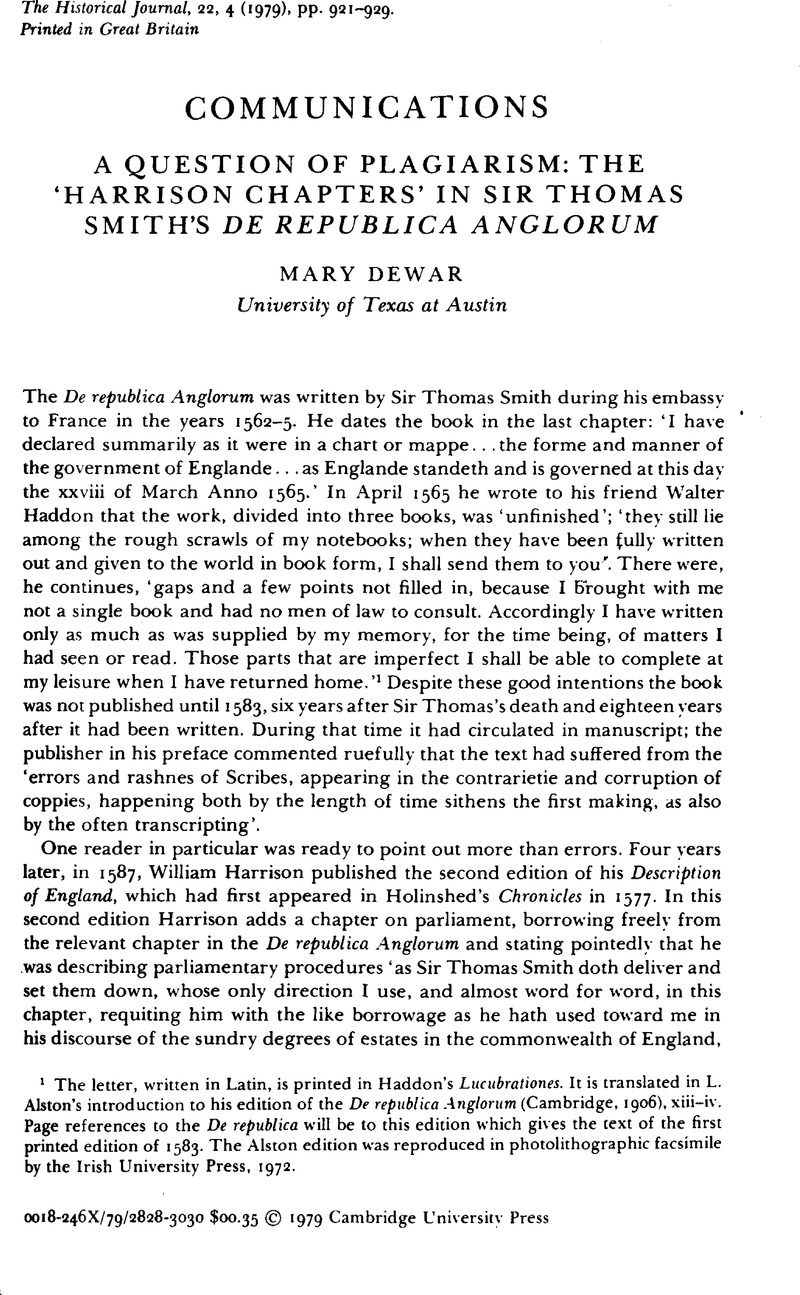Article contents
A Question of Plagiarism: The ‘Harrison Chapters’ in Sir Thomas Smith's De Republica Anglorum
Published online by Cambridge University Press: 11 February 2009
Abstract

- Type
- Communications
- Information
- Copyright
- Copyright © Cambridge University Press 1979
References
1 The letter, written in Latin, is printed in Haddon's Lucubrationes. It is translated in Alston's, L. introduction to his edition of the De republica Anglorum (Cambridge, 1906), xiii–ivGoogle Scholar. Page references to the De republica will be to this edition which gives the text of the first printed edition of 1583. The Alston edition was reproduced in photolithographic facsimile by the Irish University Press, 1972.
2 Harrison, William, The description of England, 2nd edn, 1587 (ed. Edelen, Georges, Ithaca, N.Y., 1968), 152Google Scholar.
3 Alston, op. cit. xvii.
4 The description of England (ed. Edelen), 94, n. 1.
5 Dewar, M., Sir Thomas Smith: A Tudor intellectual in office (London, 1964)Google Scholar, ch. XVI.
6 Ibid. 188.
7 Dewar, M. (ed.), A discourse of the commonweal of this realm of England (Charlottesville, 1969), xxviGoogle Scholar.
8 BL. Harl. 1130 and Trinity College, Cambridge, MS 1504.
9 Notably: BL Add. 44047, fos. 1–51; P.R.O., S.P. 15/12/47 fos. 106–40; BL Lansd. 121, fos. 30–33 (incomplete); Bodleian Library, Tanner MS 253, fos. 1–46, and Rawlinson MS D 96; MS belonging to the Earl of St Germans, Port Eliot, in a book belonging to Sir John Eliot, fos. 97–129; MS belonging to Mr Moir (incomplete). These MSS have been collated for a study of the De republica Anglorum that in these stringent times har not yet been published.
10 Edelen, op. cit. xviii; 5; 23, n. 17; 70, n. 10.
11 A suggestion which Alston considered but qualified as ‘Possibly but not probably’.
12 All extracts from the De republica which follow are from my unpublished text reflecting the agreement of all the manuscripts and therefore, as has been argued, Smith's original MS, not the amended printed version of the 1583 edition. All extracts from the second edition of The description are from Edelen's edition. Most of the extracts from the first edition of The description can be found in Alston's Appendix B or in the edition by F. J. Furnivall for the New Shakespere Society (4 parts, 1877–1908) where most of the changes made in the second edition can also be conveniently followed.
13 The Trinity MS reads ‘valewe’ for ‘revenue’.
14 Alston, 43.
15 It is (1583 edn).
16 and most usually in warres (added 1583).
17 of (1583).
18 but in England (added 1583).
19 king (1583).
20 at the marriage (1583).
21 dubbing (1583).
22 disburse (1583).
23 ar[e] (1583).
24 that abilitie (1583).
25 an CXX (1583).
26 ordaining (1583).
27 and (added 1583).
28 shall omitted (1583).
29 might be moved as a question (added 1583).
30 to the captaine (1583).
31 execration omitted (1583).
32 milites and nowe (1583).
33 at this daye for now (1583).
34 and (1583).
35 And that (1583).
36 Cf. De republica, Book I, chs 20–21 (Alston, 38–41), the 1577 Harrison version (ibid., App. B, 171–2), and the 1587 Harrison text (Edelen, pp. 113–14).
37 The 1583 edition reads ‘the title whereof shall pretende to have been found by the sayd Herauld in perusing and viewing of olde registers’ and has ‘bin recorded to beare’ for ‘borne’ (Alston, p. 40).
38 Page and line references to Alston.
39 Alston, xxi.
40 Professor Elton informs me that a manuscript of the Chronology, until recently thought lost (Edelen, xviii, n. 3), has been discovered by Mr Glyn Parry, Cambridge University, England, who is currently at work on it.
41 Ibid. 23, n. 17.
42 Edelen, p. 25, n. 19.
43 Ibid. p. 416.
43 Ibid. p. 404, n. 9.
44 The De republica Anglorum did appear as part of another larger study in 1592, when Giovanni Botero incorporated it in his Relatio de regno Angliae, Part ii of the Relationi universali (Ferrara, 1592).
- 1
- Cited by


